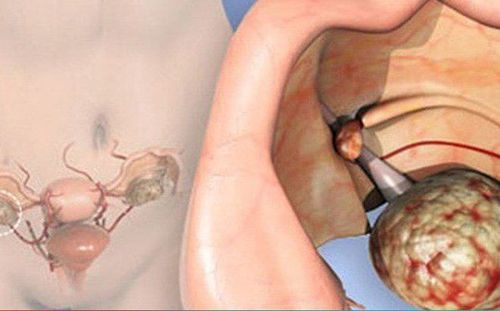This is an automatically translated article.
The article was professionally consulted by Specialist Doctor I Le Thien Quang - Internal Oncologist - Department of Medical Examination & Internal Medicine - Vinmec Da Nang International General HospitalOvarian cancer is a condition in which certain cells in the ovary grow abnormally and divide uncontrollably, leading to the formation of a tumor. The tumor will spread if not detected in time, medically called metastatic ovarian cancer. So how to detect ovarian cancer?
1. Early Symptoms of Ovarian Cancer
The early symptoms of the disease are easy to ignore because they are quite similar to the symptoms of so many other diseases. Usually, early symptoms of ovarian cancer include:
Stomach bloating, abdominal pain. Unusual bloating after eating. Anorexia. Frequent need to urinate, frequent urination. Tired. Undigested. Heartburn. Constipation. Backache. Irregular menstruation. Pain during intercourse. These symptoms persist if it is related to ovarian cancer. The increased expression of the disease is also a sign that the tumor is growing larger. If left untreated, the tumor can spread beyond the ovary and make the disease very difficult to treat.

2. How to detect ovarian cancer?
The location of the ovaries is deep inside the abdominal cavity, so it is difficult for you to feel the tumor. There is no routine screening for ovarian cancer. That is why full reporting of abnormalities is so important and valuable to diagnosis.
If your doctor suspects you have ovarian cancer, your doctor may refer you for a gynecological test. Performing a gynecological exam can help your doctor detect abnormalities, but a small tumor in the ovary can be difficult to feel.
The tumor grows and affects the bladder and rectum. Your doctor can also detect it through a pelvic exam.
In addition, doctors may also order the following ovarian cancer tests:
Transvaginal Ultrasound (TVUS): Can ultrasound detect ovarian cancer? The answer is absolutely possible with transvaginal ultrasound (TVUS). This is a type of imaging test that uses sound waves to detect tumors in the reproductive organs, including ovarian cancer. However, TVUS cannot help doctors detect if a tumor is cancerous. CT scan of the abdomen and pelvis: If you are allergic to dyes, your doctor may order an MRI test instead. Blood test to measure levels of cancer antigen 125 (CA-125): CA-125 is a product that tumors secrete, and is found to be higher than normal in people with ovarian cancer. The CA-125 test is also used to assess response during cancer treatment. However, some other diseases such as uterine fibroids, uterine cancer can also affect CA-125 levels. Biopsy: Take a small piece of tissue from the ovary and look at it under a microscope. This is the only way your doctor can tell if you have ovarian cancer. To accurately diagnose ovarian cancer, what stage the disease is in, whether it has metastasized or not, where it has spread, the doctor will combine many different diagnostic methods including surgery. , irradiation, imaging, and more.
3. Gynecological cancer screening at Vinmec
Gynecological cancer screening is necessary because:Helps you check the function of the genital organs. Helps you detect ovarian - uterine - cervical cancer in an early stage. Vinmec General Hospital is implementing the Basic Gynecological Examination and Screening Package with the following advantages:
Being examined and consulted by experienced obstetricians and gynecologists. There are a full range of tests for accurate examination and diagnosis of the disease: Liqui Prep method, automated system HPV genotype PCR test, vaginal ultrasound test of uterus and ovaries. Modern and advanced equipment and facilities, best support for testing.
Please dial HOTLINE for more information or register for an appointment HERE. Download MyVinmec app to make appointments faster and to manage your bookings easily.














